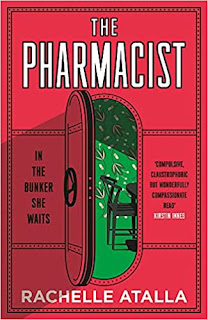I remember when I read 1984, and talked about it to people afterwards, being surprised when they declared it was science-fiction. I’d already read quite a bit of Orwell at that time – I was obsessed with Down and Out in Paris and London – and Orwell was very obviously a social realist, so I read 1984 in that vein. It genuinely didn’t dawn on me that it was, clearly, science-fiction.
Much the same thing happened when I read Rachelle Atalla’s The Pharmacist and then read some online reviews, which talked of it as speculative fiction. Well, of course it is. It’s a dystopian novel set in a future society following a nuclear devastation, with the last few humans living out a tedious, seemingly pointless existence in a nuclear bunker. If that’s not speculative fiction, what is? And yet, like 1984, I read it as a straight narrative. That’s a testament to the skill of the novelist Rachelle Atalla. She has created a world that is alien but immediately and entirely believable. Virtually every review I’ve read of The Pharmacist uses the word “claustrophobic” and it is certainly the case that Atalla has created a work that immerses the reader in its very restricted environment.
The bunker is populated by the few survivors of some unexplained nuclear catastrophe. These are presumably people of worth or value, men and women with particular skills or attributes considered useful, no doubt taken from the upper strata of the previous society. We are told that anyone outside this and any other nuclear bunkers will be dead, including close family of many of the bunker’s residents.
This is no idyll the survivors have arrived at, however. They sleep in huge dormitories in bunk beds four high, subsisting on pouches of puréed food and wearing uncomfortable boiler suits. At one point a wall descends, splitting the bunker in two, arbitrarily separating families. No one knows why. Rumours abound, but no one makes any serious attempt to find out. This, then, is a wholly passive society, institutionalised and acquiescent.
The story is told by Wolfe (her first name is Alison, but first names are little used in the bunker as they are “considered a cast-off from a life that no longer existed”). Wolfe is the eponymous pharmacist who dispenses drugs to the residents, all of whom appear to be on some form of medicine. Her dull existence is shaken, firstly by the arrival of a young woman, Levitt, as her assistant, and secondly by becoming caught up in the circle of ND, the populist Leader of the bunker society. Like all populists – think Trump, Clown Johnson, Viktor Orbán – he cares not a jot for the populace who have afforded him his privileged position. Corruption rules. This is a brutal society where ND’s word is enforced by organised violence, and Wolfe is drawn into a world of lies and deception, setting in motion a chilling and all too credible series of events.
What makes the world of The Pharmacist so real is the way Atalla weaves together the micro and the macro. The claustrophobia reviewers have highlighted comes from the detail that Atalla lays over the narrative, the recording of minutiae, the way the most trivial detail gains – because of the tedium of the bunker people’s existence – a heightened sense of importance.
But alongside this, the human element of the story, is the macro, or political level. And this is the core of the novel: what is society? How does it operate? How is it corrupted and how complicit are we – every single one of us – in that corruption? It seems particularly apposite to be discussing these questions at this juncture in Britain’s story: daily we are witnessing our own society rotting from the head down, our political class comprising the corrupt and the complacent, our media craven and complicit and the general population seemingly content to allow our ethics and sense of decency to wither and die. What happens in The Pharmacist is what is happening to us today. Give us a few years and that bunker will be our reality.
Kirstin Innes, reviewing the novel in the Press and Journal, noted that Atalla revealed Donald Trump and Boris Johnson had both informed the development of the character of ND. It is the cult of personality that such populists create which is so dangerous and Atalla explores this in a compelling and chilling way. The insidiousness of these tyrants’ assaults on decent society is deeply troubling. This is how the law is transformed into a plaything, there to do the bidding of the leader. Don’t like an election result? Change it. In danger of falling foul of the ministerial code? Dilute the code. Don’t like the look of that young man? Send him to Rwanda. Drip, drip, drip, society is corroded, compromised, sullied.
I suppose, then, the big fear is that The Pharmacist could be all too prophetic. This is what Wolfe is confronted with and what, ultimately, she fights against. She represents what we all hope we might be, when the time comes, when decisions have to be made, fights fought. She is decency, the love that must prevail. The society that holds.
The Pharmacist is a novel that works
on different levels, a thrilling story which at the same time projects a
powerful message about the dangers of corruption. We would do well to heed it.
